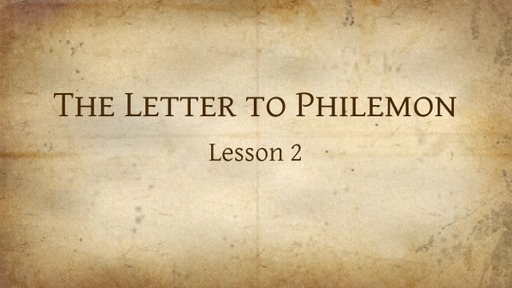Study of the Letter to Philemon

Sermon • Submitted • Presented • 36:52
0 ratings
· 135 viewsSunday Evening Lesson
Files
Notes
Transcript
What is the Situation?
What is the Situation?
Paul, a prisoner for Christ Jesus, and Timothy our brother, To Philemon our beloved fellow worker and Apphia our sister and Archippus our fellow soldier, and the church in your house: Grace to you and peace from God our Father and the Lord Jesus Christ.
Back Story on Philemon
Wealthy Christian
Resident of Colossae
Met Paul and was converted
Member of the church in Colossae
I thank my God always when I remember you in my prayers, because I hear of your love and of the faith that you have toward the Lord Jesus and for all the saints, and I pray that the sharing of your faith may become effective for the full knowledge of every good thing that is in us for the sake of Christ. For I have derived much joy and comfort from your love, my brother, because the hearts of the saints have been refreshed through you.
Back Story on Onesimus
Bond servant to Philemon
Stole from Philemon and is on the run
Became a Christian Via Paul while in Rome
Accordingly, though I am bold enough in Christ to command you to do what is required, yet for love’s sake I prefer to appeal to you—I, Paul, an old man and now a prisoner also for Christ Jesus— I appeal to you for my child, Onesimus, whose father I became in my imprisonment. (Formerly he was useless to you, but now he is indeed useful to you and to me.)
Letter’s Objective: Convince Philemon to forgive Onesimus and embrace him as a brother in Christ
bearing with one another and, if one has a complaint against another, forgiving each other; as the Lord has forgiven you, so you also must forgive.
Paul is asking Philemon to do what Christ has already done for us
Paul was consistent in his teaching
Now if anyone has caused pain, he has caused it not to me, but in some measure—not to put it too severely—to all of you. For such a one, this punishment by the majority is enough, so you should rather turn to forgive and comfort him, or he may be overwhelmed by excessive sorrow. So I beg you to reaffirm your love for him. For this is why I wrote, that I might test you and know whether you are obedient in everything. Anyone whom you forgive, I also forgive. Indeed, what I have forgiven, if I have forgiven anything, has been for your sake in the presence of Christ, so that we would not be outwitted by Satan; for we are not ignorant of his designs.
One of the reasons this is hard for us is because we too often assume forgiving a trespasser means allowing an injustice to stand.
When we forgive, we are confessing that vengeance is God’s
Beloved, never avenge yourselves, but leave it to the wrath of God, for it is written, “Vengeance is mine, I will repay, says the Lord.”
When you forgive someone you are not saying that what happened is “okay” or that the relationships involved are back to “normal” (whatever that is).
Instead you are confessing that judgment is coming and you can trust the One who will be seated on that throne.
You don’t have to store up bitterness, and you don’t have to find ways of retaliation for what’s been done to you.
You can trust a God who is just.
7 Thing Forgiveness is NOT:
7 Thing Forgiveness is NOT:
1. FORGETTING
1. FORGETTING
When you forgive someone your memory isn’t suddenly wiped clean of the offense. Our brains can’t to that. God could do that, but it seems that would be the easy way. God wants forgiveness to be more intentional than that.
2. REGAINING AUTOMATIC TRUST
2. REGAINING AUTOMATIC TRUST
You don’t immediately trust the person who injured you when you forgive them. That wouldn’t even be logical. Trust is earned, and they must earn trust again.
3. REMOVAL OF CONSEQUENCES
3. REMOVAL OF CONSEQUENCES
Even though you forgive someone, they may still have consequences to face because of their actions.
4. IGNORING THE OFFENCE
4. IGNORING THE OFFENCE
You don’t have to pretend nothing happened when you forgive. The reality is an offense was made. Acting like it never occurred only builds resentment and anger.
Be angry and do not sin; do not let the sun go down on your anger, and give no opportunity to the devil.
5. INSTANT EMOTIONAL HEALING
5. INSTANT EMOTIONAL HEALING
When the pain of a past hurt still stings, we tend to think we haven’t forgiven the offender. While we make the choice to forgive, it doesn’t mean we instantly feel better. Healing is a journey best done with our heavenly Father. But know this… forgiveness is a necessary ingredient in the healing process.
Without forgiveness, bitterness and resentment begin to take root. That same bitterness and resentment will slow, possibly even stagnate the healing.
6. RESTORING THE SAME RELATIONSHIP
6. RESTORING THE SAME RELATIONSHIP
The relationship may be closer than before or not, but most likely it will never be the same. Forgiving an offense does not mean tolerating behavior that is hurtful. On the contrary, we are called to speak the truth in love
Rather, speaking the truth in love, we are to grow up in every way into him who is the head, into Christ,
7. A LEVERAGE OF POWER
7. A LEVERAGE OF POWER
Granting forgiveness does not give a person power over the person being forgiven. That would violate the entire principle and purpose of forgiveness.
